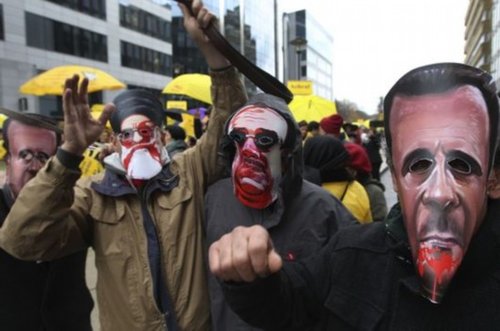EU reinforces restrictive measures against Iran
 0 Comment(s)
0 Comment(s) Print
Print E-mail
Xinhua, December 2, 2011
E-mail
Xinhua, December 2, 2011
The European Union on Thursday extended its sanctions against Iran, in response to protesters storming the British embassy in Tehran and the country's ambiguous nuclear projects.
 |
|
Iranians wear masks in Brussels?to protest against a decision made by the European Union to extend its sanctions against Iran on Dec. 1. [Photo: QQ.com] |
According to a conclusion adopted by the EU foreign ministers who met the day in Brussels, the 27-nation bloc decided to add 143 entities and 37 persons to the list of asset freezes and economic travel ban.
The new measures target entities and individuals directly involved in Iran's nuclear activities, as well as those with links to Iran's shipping system and national army.
"Additional measures including measures aimed at severely affecting the Iranian financial system, in the transport sector, in the energy sector, measures against the Iranian Revolutionary Guard Corps, as well as in other areas," said the conclusion.
The ministers vented their angers at the meeting over the Tuesday storming of the British embassy in Tehran, condemning it as a violation of the Vienna Convention.
"The Council considers these actions against the UK as actions against the European Union as a whole. The EU is taking appropriate measures in response," said the conclusion.
There have been speculations ahead of the foreign ministers' meeting that the EU might resort to an oil embargo against Iran in the aftermath of the Tuesday incident. Several European countries have recalled their ambassadors to the country.
However, the Thursday meeting failed to cut a deal on a crude embargo on Iran apparently due to the significance of oil supplies from the country to the debt-laden continent.
In their conclusions, the EU foreign ministers again reaffirmed the longstanding commitment to work for a diplomatic solution of the Iranian nuclear issue.
The International Atomic Energy Agency (IAEA) suggested that Iran has engaged in nuclear weapon-related research activities in a recent report. The nuclear watchdog, however, did not conclude that Tehran is currently attempting to develop such weapon.
Iran had dismissed the findings in the IAEA report as fabricated by Western countries and insisted the country's nuclear activities is purely for peaceful purposes.





